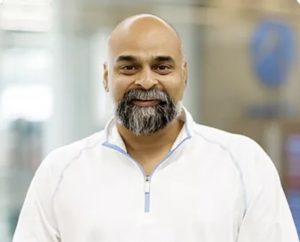
Aravind Asokan, the principal investigator at Asokan Lab (Synthetic Virology & Gene Therapy), did not grow up knowing or even thinking that he’d become a scientific researcher. In fact, science never particularly interested him until much later in his university years. He grew up in India where the educational system tends to focus less on being well-rounded and more on striving to be at the top of your class and getting into a good college. So although he was taking science courses throughout his middle and high school years, the goal of attending a top university provided him with most of his direction.
He achieved this goal and after four and half years in a dual degree program in India, he acquired a master’s in biology and a bachelor’s in pharmaceutical sciences. This period in his life was very similar to his transition from high school to university, in that he had a broad sense that he wanted to be in BioTech and knew that he needed to go to graduate school in the United States. After his Masters at Ole Miss, his intellectual curiosity led him to an interest in the relatively new field of gene therapy. Now knowing his specific interests, he applied to and finished his Ph.D. program at UNC-Chapel Hill where he worked on synthesizing lipids for DNA delivery into cells. It was after his 3 years of postdoctoral fellowship that he was offered a role as a faculty member with his own lab and full control of his intellectual pursuits. This made all the difference.
Intellectual freedom is exciting but Asokan finds that bringing in the right people for the lab is equally as exciting. His lab members play a critically important role because his vision can only go so far and it’s the people coming into the lab that extend his vision and begin to build their own. This is why Asokan is inclined to bring individuals with diverse scientific backgrounds ranging from yeast cell biology to tuberculosis in zebrafish. During his years in school, Asokan admits to not really having a precise direction and allowing his excitement and desire to be involved in a field to take him wherever he may go. He looks for similar characteristics in his lab members and loves to take in those who deeply want to be involved and who will make the best of the opportunity. Bringing in people who are curious, driven, but often have no background in synthetic virology or gene therapy is what makes his lab successful. The diversity of perspectives allows challenges to be tackled from different angles, which is often what brings about breakthroughs.
It is also through his lab members that Asokan wishes to leave a legacy. When asked about scientific legacy he said he wasn’t concerned with his own and that he often doesn’t think about it. What he does think about is the impact that his graduate students will have on the world. He knows that these individuals will go and take on opportunities with an optimistic and curious drive. As he pointed to the names of several lab alumni which he had pinned on the wall behind his desk, he asked me to imagine not only the students currently working in the lab right now but also the ones who are to come and go in the future. The impact that these individuals will have when they leave the lab is his legacy. Regardless of what they decide to do after their degrees, whether they continue researching, go into BioTech consulting, or leave science altogether, it doesn’t matter to him because he knows they will make a beneficial impact.
